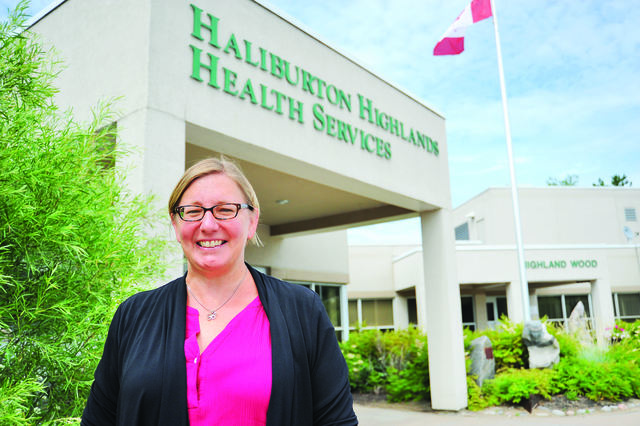The emergency departments at Haliburton and Minden hospitals continue to operate as normal thanks to agency nurses covering staffing gaps, Haliburton Highlands Health Services (HHHS) president and CEO Carolyn Plummer says.
In a Jan. 7 community update, followed by a Jan. 10 interview, Plummer said, “It’s not something that we want to be doing for the longer-term, but I’m thankful we have that option right now to help get us through this tough time.”
In a Nov. 22 letter to the community, Plummer said that HHHS’ continued challenges around staffing and nursing capacity meant that it was very likely they would need to reduce service at one of their emergency departments, including closures during certain hours and days.
Despite Omicron forcing eight per cent of staff to isolate since Christmas Day, Plummer said they’ve been able to stay the course.
She said they are working with various agencies across Canada to recruit mostly Ontario-based staff for short-term coverage. She stressed that staffing challenges are not new to HHHS and pre-date the pandemic, but COVID-19 has exacerbated it.
“In the past, it may have taken time but we were able to recruit people to replace folks retiring, for example. Now the pool of available nurses for recruitment is basically non-existent. So it’s become increasingly difficult to find staff to come here and it just isn’t here, it’s everywhere.” Plummer noted in her Jan. 7 community update that major urban hospitals such as Willian Osler Health Systems in the GTA have seen demand for services outpace available staffing recently and Campbellford Memorial Hospital had to close their emergency department overnight on Dec. 24 as a result of insufficient staffing.
Plummer said the agency nurses “are coming from all over the place. We have some from the GTA, and other parts of the province. We’ve even contracted with an agency out of British Columbia.” She said in some instances, nurses may work at another setting and are coming to earn some extra money.
HHHS is having to provide accommodations and Plummer said they have been working with AirBnBs, particularly ones close to both hospital sites.
Asked for an estimated cost to date, the CEO said she was still waiting on that but it will likely be made public at the board’s Jan. 27 meeting. According to Indeed, as of May 1, 2021, the average salary for an agency nurse is $41.56 per hour in Canada. Another employment site said the cost of nursing service provided by an RPN ranges from $45 to $60 per hour, while the rate for a RN is $55 to $80 per hour. Companies can require a minimum number of hours per visit, and discounts may also be offered if organizations hire a nurse for more than a certain number of hours.
Plummer said the agency nurses do come at a “premium.” She added that every time someone new arrives, although they have nursing skills, they do not know the organization and other staff have to continually assist with onboarding.
She said the long-term solution continues to centre on recruitment, although they have not had a lot of luck recently. HHHS will be hiring student nurses in future, which have resulted in permanent, full-time hires in the past.
They’re also having a nursing fair later this month. However, she said they are competing with hospitals across Canada. Plummer is grateful they have not had a problem finding agency staff. She’s also hopeful the provincial government will help HHHS – which is already in a deficit position – to cover the added costs.
“The direction we’ve been hearing from Ontario Health is we’ve got to do what we’ve got to do to remain open and avoid reducing services and that’s what we need to do for this community as well so we’re hopeful that the incremental costs associated with all of this will be covered, that we will get help with those costs.”
However, Plummer encouraged the community to stay safe and follow all public health advice. “Things are still precarious. It wouldn’t take much for Omicron to have a real effect on our staffing. So, we’re not saying we’re out of the woods by any means, but we’re doing what we can to stay open and avoid service reductions.
We are also at the same time preparing for what has to happen if we’re not able to (adequately staff).”





